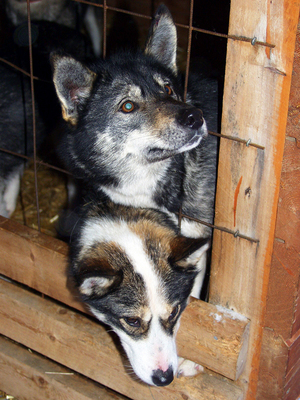 Why spay or neuter your pet? Why spay or neuter your pet?
The unfortunate reality is that more than 4 million pets are euthanized in U.S. animal shelters each year. This needless loss of life can be prevented by having pets spayed (females) or neutered (males).
Spaying Your Female Pet (Ovariohysterectomy)
Spaying eliminates unwanted pregnancies. An ovariohysterectomy is the removal of the ovaries and uterus. We recommend doing this for puppies and kittens between the ages of 6 to 8 months. There are real benefits from doing this early in an animal’s life. If spayed before the first heat cycle, your pet has less than 1% chance of developing breast cancer. If the animal has had two heat cycles, this increases to a 26% chance of developing breast cancer later in life.
Other benefits include:
Pets with diabetes or epilepsy should be spayed to prevent hormonal changes that can interfere with medication.
Spaying eliminates the risk of ovarian and uterine cancers and infections.
Neutering Your Male Pet (Castration)
Castration is the removal of the testicles, usually performed at 6 to 8 months.
Besides the most obvious benefits—reducing an animal’s desire to roam and spray—neutering offers several other benefits:
Neutering eliminates the risk of testicular cancer, the second most common tumor in male dogs.
It reduces the risk of anal tumors, which are testosterone related.
It reduces the incidence of prostate problems later in life.
It reduces aggression and fighting.
Neutering eliminates or reduces spraying and marking in males neutered before 8 months of age. It also reduces the smell of urine, especially in cats.
It limits the spreading of sexually transmitted diseases, such as Feline Leukemia and FIV.
|
COMMON MYTHS
Spaying or neutering your pet does not . . .
• cause laziness or hyperactivity.
• make your pet gain weight.
• reduce its instinct to protect your home and family.
• alter your pet’s personality in any manner.
• postpone or delay normal maturity.
COMMON EXCUSES WE HEAR . . . AND OUR ANSWERS
“I’m concerned about the anesthetic.”
The anesthetic used by veterinarians today is the same as used in human medicine. Your pet is monitored very closely during surgery. The benefits greatly outweigh the small risk with anesthesia.
“I think children should watch the miracle of birth.”
Because animals need privacy when giving birth, they usually give birth in a place they choose and at night. Therefore, the child would probably miss it anyway. Also, not all animal births are “normal” and may be distressing even to adults, let alone children.
“I want to breed my animal so I can make money.”
Any good breeder breeds for the improvement of the breed only.


 Why spay or neuter your pet?
Why spay or neuter your pet?